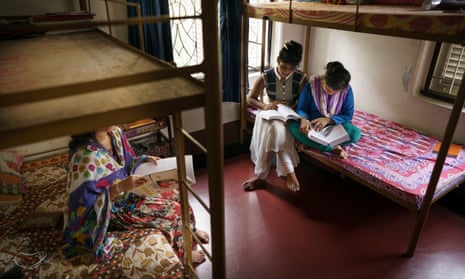Saira* wants to become a lawyer so she can put her rapists in jail. “I want to fight my own case and put those monsters behind bars,” says the 31-year-old from West Bengal.
She may achieve her objective. In June, after three years of study, Saira will become the first student to graduate from a unique programme that offers survivors of sexual exploitation the chance to enrol in fully funded law courses.
When she was 17, Saira met a man who offered her what she thought would be a lucrative job. She was keen to find work to help support her family, who lived on a low income. Instead of a job, however, Saira was held captive and raped repeatedly by the man and several of his friends.
She managed to escape after a month but had no money or support to pursue legal action. Her attackers continue to roam free, which makes her angry and more determined to complete her studies. “When I become a lawyer, I will seek justice for myself,” she says.
The School for Justice (SFJ) programme was founded in April 2017 in Kolkata and is run by NGO Free a Girl India, which fights the sexual exploitation of children, in partnership with local NGO Sanlaap and a law school. Those enrolled get their fees paid, receive stipends and in some cases receive free accommodation in a safe house. They are also given counselling.
Seven women are currently enrolled on a law course in Kolkata and 11 more have begun courses in Mumbai since January last year.
Most of the women are from lower income communities and ethnic minorities. Some were kidnapped or lured away from home under a false pretext, before being forced into sex work.
“Our aim is to empower the girls to turn their lives around via education. Once they have completed their law education and become lawyers, we hope they will seek justice for themselves as well as for other girls trapped in sexual slavery,” says Shikha Philips, CEO of Free a Girl India.
According to the National Crime Records Bureau’s report for 2016 – the latest year for which information is available online – of every five people trafficked in India, three were children, and more than 50% were girls. However, only a tiny fraction of the perpetrators are convicted each year.
“We hope our law graduates will become change-makers from within the system,” says Philips.
The women are referred to SFJ by local NGO partners. When they arrive they are often traumatised and fragile, says Philips. “So at first, we focus on their holistic rehabilitation – assessment of their medical and nutritional needs, emotional counselling, psychiatric treatment, among other things.”
The courses are taught in English, so those who hail from rural or disadvantaged backgrounds, and struggle with the language, have a mentor to improve their skills. “The girls are also given a stipend and all the resources they need to take on the challenges of an intensive, multi-year, law programme,” says Philips.
Amira*, 22, who joined the programme in 2019, lived on-and-off the streets for several years. She was sexually abused.
“During my early days at SFJ, I was so nervous and ashamed of my past that I couldn’t even think clearly. This programme has given me so much clarity and helped me evolve into a confident person,” she says.
“Now, I can’t wait to complete my law education and join an NGO, so I can help others, just like I’ve been helped by SFJ. Studying family law in school has made me aware of so many things including my own rights, and the rights of women and children. I want to ensure these rights are protected.”
One of the biggest challenges faced by SFJ is the high dropout rate. The social stigma surrounding survivors of sexual exploitation can affect morale and make it difficult for students to focus on their education. The women studying in Kolkata live together in a safe house, but those in Mumbai live with their family.
Tapati Bhowmick of Sanlaap says: “We counsel the girls on a daily basis but, of late, we have also begun to conduct regular sessions with the parents as well. We have realised it is important to allay their fears too, so they do not pressurise their daughters to drop out. It’s only natural that they are concerned for their safety and wellbeing.
“We hope that our girls will become not just lawyers, but rather activist-lawyers. That way, they can advocate changes in the legal process, based on their own experiences of the system.”
SFJ hopes to expand the number of courses it can offer to cover social work, counselling and journalism. “This will further strengthen our fight against the impunity with which sexual exploitation of children continues to happen in India,” says Philips.
Saira says being a survivor of sexual exploitation means she can understand the pain and frustration faced by girls and women in similar situations when seeking justice. “I am better equipped to help them navigate the legal system,” she says.
Saira hopes to become a judge. “With SFJ’s support, I can achieve anything I put my mind to,” she says.
* Names have been changed to protect survivors’ identities.
